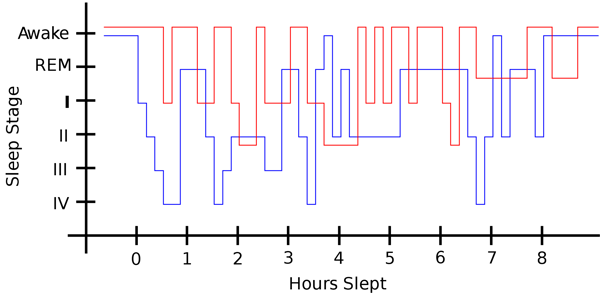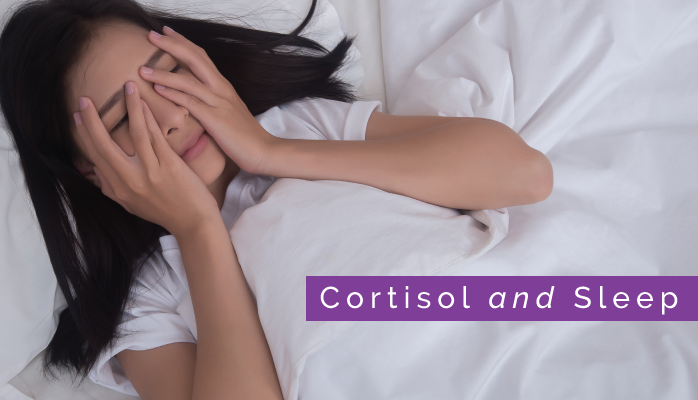Contributing factors to quality sleep
Sleep quality is impacted by many contributing factors. Sleep position, cortisol levels, dietary considerations, light exposure, and many more factors all play a role in sleeping. Many of us are looking for ways to improve our sleep quality, because of the myriad of benefits that high-quality sleep provides:
- Improved alertness and memory
- Reduction of chronic pain
- Reduced inflammation
- Increased energy levels
One of the most often overlooked factors for improving overall sleep quality is the body’s primary stress hormone: cortisol. Cortisol is an internal chemical signal that is released as a response to external or internal stressors.
For example, let’s say you are driving your car on your commute home from work. You notice a police car in your rear view mirror. Your attention returns to the drive ahead. Then, ten minutes later, you see the flash of blue and red lights in your rear view mirror and realize you are being pulled over.
We all know that feeling: heart rate increases, breathing becomes quicker and deeper, maybe a little sweat on the forehead, and maybe the face feels a little flushed. That response is called “sympathetic nervous system arousal” and it is caused largely from the body’s release of cortisol.
How Cortisol Levels Affect Sleep
Now let’s be clear, there are several hormones and neurotransmitters that are responsible for sympathetic nervous system activation, including cortisol. For a healthy individual, cortisol levels should be at their peak in the morning, and should be at their lowest in the late evening.
This rhythm is very important for training the body’s sleep cycles and energy rhythms. This way you have your peak energy in the morning and lowest energy in the night. This correlates very well with your normal activity level and trying to establish a good sleep pattern.
Stress-response in Nature
In nature, cortisol is extremely important for survival. If you are a zebra, and you are getting chased by a lion, you need to put your body on high-alert and get yourself out of there pronto! Let’s say you safely escaped the lion. For zebras, the cortisol levels immediately lower themselves back down and it would be time to return to grazing.
Cortisol responses regulate themselves with the parasympathetic nervous system, or your "rest and digest". The PNS takes over to reverse the effects of the sympathetic nervous system because that should be a temporary state for your body.
In humans, our brains can get stuck in feedback loops. For example, we experience that same spike in cortisol and fight-or-flight reflex, but instead of it being a lion chasing us, it’s stress from the upcoming mortgage payment. Or the high-stakes meeting you have tomorrow. Or any other type of stressor in life. We have a harder time down-regulating that stress response, because our brain can nearly ALWAYS find something stressful to ruminate on.
3 Practical Takeaways for improved Cortisol Regulation
Now that you know a bit about cortisol, and assuming that you are not in fact a zebra, here’s a few tips for regulating it well in day to day life.
This graph shows a normal sleep rhythm (blue) vs someone with poor sleep (red)
1- Reduce screen time at night.
Blue light stimulates the body and increases production of cortisol. Remember that cortisol levels are highest in the morning? Well that is in-part due to the signaling that blue light causes in the body. Blue light basically tells the body, “HEY WAKE UP!”. Try reducing screen time or wearing blue-light blocking glasses while watching TV in the evening.
2- Get sunlight in the morning.
Similar to why it’s important NOT to get blue light exposure in the evening, it’s just as important to SEEK sunlight in the morning. Sunlight is the best light for our bodies – it’s full spectrum and our bodies respond to morning sunlight with a cascade of biological training. Morning sunlight exposure will improve energy levels and facilitate improved sleep later in the day.
3 - De-stress throughout the day.
Meditation, mindfulness, quiet-time. Whatever you want to call it, the point is this: take a little time to close your eyes, take 3-5 deep breaths, and just relax the mind. An easy option is doing this in the bathroom, or after you park your car and before you walk into the home or into work. Taking a little time to relax the mind and focus on your breathing helps the body down-regulate the stress response and enter into “parasympathetic nervous system arousal”, which is a fancy way of saying, “relaxed, calm, restful” mode.
Incorporating these three tips can greatly reduce the negative impact of unregulated cortisol, and give the body the support it needs for an awesome night’s sleep, and energy upon waking. Reach out to us with a free sleep test if your cortisol levels are interfering with your sleep:


